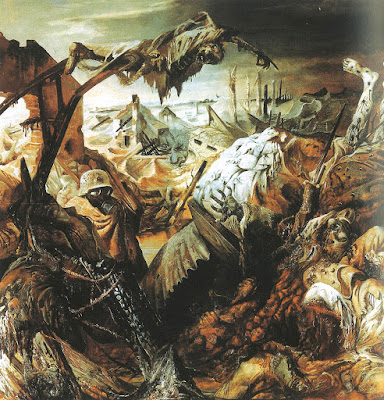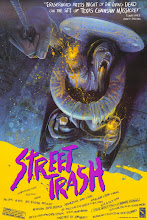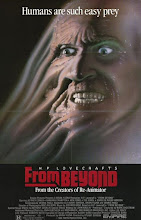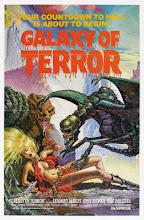Otto Dix (1891-1969) was a German painter and print-maker, considered to be one of the most important artists of the Reich's post-World War I Neue Sachlichkeit period. Along with his contemporaries in the anti-art and Dadaist movements, I see Dix's work as being a crucial influence on the graphic artists involved with punk and hardcore from the late '70s onwards. You can see his influence all over the graphics of bands and labels associated with the anarcho-punk scene: from Crass, Subhumans, Conflict, Discharge and Amebix to the crust and d-beat bands of today.
I'm certainly no expert on Dix, but I don't think the motivation for his controversial art (that would later be labelled as "degenerate" by the Nazis) came from the same place as the Dadaists, who were outspoken pacifists and affiliated with the radical left. After all, at the outbreak of WWI he immediately volunteered for service, seeing action as an NCO of a machine-gun unit from 1915 until the end of the war in 1918. I could be wrong, but my understanding is that where the Dadaists had a definite leftist agenda, Dix's work sprung from his ability to clinically and objectively observe his experiences (both in combat and post-war Weimar Germany), and a need to record and find meaning in what he saw. To paraphrase a famous quote of his:
All art is exorcism. Painting is the effort to produce order; order in yourself. There is much chaos in me, much chaos in our time.
And as to his stance on war and pacifism, he is quoted as saying:
I had to experience how someone beside me suddenly falls over and is dead and the bullet has hit him squarely. I had to experience that quite directly. I wanted it. I'm therefore not a pacifist at all - or am I?
All art is exorcism. Painting is the effort to produce order; order in yourself. There is much chaos in me, much chaos in our time.
And as to his stance on war and pacifism, he is quoted as saying:
I had to experience how someone beside me suddenly falls over and is dead and the bullet has hit him squarely. I had to experience that quite directly. I wanted it. I'm therefore not a pacifist at all - or am I?
And what experiences he had. He bore witness to the horrors and atrocities of prolonged combat in some of WWI's most infamous hellholes, most notably the Western front battles of the Somme and Flanders (the end of the war saw him injured and awarded the Iron Cross). His post-war observations are no less confronting, juxtaposing the hedonistic cultural excesses of the 1920's with heartbreaking images of the war's aftermath and the struggling underclass left in its wake. Broken, mutilated and discarded men - used up by the state and cast aside. The prostitutes that these men relied on for companionship and sex - also to be abused and thrown away.
It's hard to imagine the scale of a war that can take the lives of 17 million people in a mere four year period, but Dix's paintings and prints offer us a sobering view into the realities of that nightmarish hell. Sadly, his work is just as relevant now as it was then, an enduring reminder of the terrible exploitation and waste of life wrought by human conflict.
I can remember as a kid thinking that I'd dodged a bullet by being born in the late '60s. The way I saw it, with WWII, Korea and Vietnam behind us, I seemed to have been born into an era of prosperity and peace (I was too young obviously to understand the concept of the Cold War that still raged). I can vividly remember as a 13-year-old in '81 reading the lyrics to "Paid Vacation" by the Circle Jerks and thinking "now way, that will never happen":
It's not Vietnam,
Little did I know how prophetic those words would be, and now of course I can see how utterly naive I was. In times of peace there is always war looming on the horizon. Perhaps the work of Otto Dix will one day be seen as part of a pre-written epitaph for our species, doomed to extinction by our insatiable hunger for profit, resources, territory and religious dominance. For now his art can provide an alternative and an antidote to the ever present jingoism that seems to have become so entrenched in our media and entertainment.
I can remember as a kid thinking that I'd dodged a bullet by being born in the late '60s. The way I saw it, with WWII, Korea and Vietnam behind us, I seemed to have been born into an era of prosperity and peace (I was too young obviously to understand the concept of the Cold War that still raged). I can vividly remember as a 13-year-old in '81 reading the lyrics to "Paid Vacation" by the Circle Jerks and thinking "now way, that will never happen":
It's not Vietnam,
just another oil company scam.
Salute that flag of Uncle Sam.
Get your money out, place your bets...
it's Afghanistan!
Little did I know how prophetic those words would be, and now of course I can see how utterly naive I was. In times of peace there is always war looming on the horizon. Perhaps the work of Otto Dix will one day be seen as part of a pre-written epitaph for our species, doomed to extinction by our insatiable hunger for profit, resources, territory and religious dominance. For now his art can provide an alternative and an antidote to the ever present jingoism that seems to have become so entrenched in our media and entertainment.





































_poster.jpg)

































































No comments:
Post a Comment